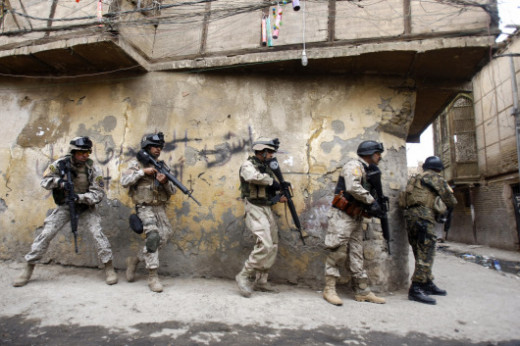Mr. Bush Goes To Iraq

The Monster Named Saddam
With former president George W. Bush's presidential library opening up, it has brought back into the limelight some of his most controversial decisions in office. Most notably among these decisions was the one in 2003 to invade the middle east country of Iraq. Everyone knows what was wrong with the decision, at least why everyone who protested the war did in fact protest it. Shortly after arriving it was confirmed that the weapons of mass destruction that we were assured were there weren't actually there.
While Bush may have invaded based on bad intelligence, it was still the right call. It may have been for all the wrong reasons but it was indeed the right thing to do. The assumption that Saddam Hussein held at his disposal WMDs was one that was easily arrived at based on history and knowledge of the type of character that he was. Decades before he attempted genocide on the Kurdish people in Iraq, spraying them with poisonous gas and spraying them down from helicopters. Until they were forced to be shut down in the early 1990's, he had facilities that produced thousands of tons of deadly gases. He denied access for reviewers to check whether the facilities were still operational and whether he had other WMDs. Regardless of whether or not he had them, Saddam was intent on promoting the image that he did have that kind of mass killing power at his hands. For any dictator the access to extreme force and willingness to use it is essential to ensure the fear of both enemies and those under him. It is this fear that allows them to stay in power.
Now all that being said, the world's super power should still have an intelligence agency that is capable of breaking past stiff defenses to find out information, especially information as pertinent as whether or not an enemy nation has WMDs. Either our intelligence agency was incapable of finding good information on Iraq or it knowingly lied to the president. As Timothy Weiner explains in his history of the CIA, all of which is from on the record sources, Legacy of Ashes, it turns out that the agency has been greatly overrated in its abilities.
However, even if we had known that Iraq had no weapons of mass destruction, the decision to invade and liberate the country would have been the right one, at the very least one that could be defended. Removing Saddam from power was reason enough alone to enter the country. To see just how ruthless and despicable the man was, one only have to know of the event when he came to power.
In 1979 there's a gathering of the Ba'ath party who was in charge of Iraq. Once everyone is in, the guards lock the door and Saddam calls the meeting to order. From a side door a man is dragged in, beaten and bloody, by guards. He starts by confessing to the crimes that he has committed. As this is going on, Saddam kicks back and lights a cigar. Then the man starts reading from a list of names and as he's reading, guards move and take the people called out into another room. The longer this goes on, the more hysterical the remaining people get. Before long they're crying out with praise and worshiping Saddam because they haven't been called yet. All in all about half of the room is removed by guards and the remaining half are in tears praising the leader.
That's just the first half of the event though. Next the remaining members are taken to where their former colleagues are being held and handed firearms. They are commanded to shoot them, thus implementing them in the heist. Not even Stalin thought of that. Once he took power, things did not get much better for the people Iraq.
Anyone who dared to rebel and challenge the leadership of Saddam was putting their life in danger. The Kurdish people of northern Iraq who wanted a democracy were crushed with attempted genocide, using deadly poisons to attack the cities that were home to them. Later he invaded Kuwait resulting in the operations of the Gulf War. Iraqi cities were plastered with images of the dictators face to create the appearance of appealing to all demographics. The two times he held elections, 1995 and 2002, he won in unprecedented landslides. In 1995 he claimed 99.47% turnout with 99.96% voting for him. In terms of the population he received just 3052 negative votes in an electorate of 8.4 million people. Seven years later he claimed 100% turnout and 100% voting in the affirmative for him. Needless to say, to call such elections democratic in any way is to lie to one's self.
To say that Saddam Hussein was a "bad guy" is to display and reveal an ignorance about the man and his actions. His brutal regime categorized by massive death tolls and torturous oppression needed to be removed, something that should have been done when he was being removed from Kuwait. While George W. Bush may have decided to invade Iraq based on bad information, it was still the right thing to do even if it was for the wrong reason.

The New Monster in Town
Where things all started to go wrong, where we lost the support of the Iraqi people (or at least most of them, some still supported us and some were opposed to us from the start), was after Saddam had been removed from his seat of power. A number of incidents happened which fueled the anger of the Iraqi people. One such incident occurred when a convoy of four Blackwater vehicles entered into an intersection and after a moment began to open fire.
From here it is a matter of which story you believe, the one from Blackwater's report and the testimony of eyewitnesses. Blackwater's report said that the reason that the convoy fired upon the nearby civilians was because a car hadn't stopped and was coming towards the convoy. Fearing that it might be a suicide car bomb they opened fired, killing the driver as well as others and injuring even more.
According to eyewitnesses, the vehicle only started moving after the men started to open fire because the dead driver was pushing the clutch, thus causing the car to be in neutral and roll down towards the intersection. Whichever version of events one follows, after the incident the man put in charge of Iraq called for charges to be brought against the men who at the very least over reacted and at the worst killed Iraqi civilians unprovoked.
To add insult to injury, it turned out that these men were unable to be prosecuted in any way. Blackwater is a private contractor who made a financial killing when the Iraq war hit, providing security for many of the most noted American political figures when they came to visit troops and see how the situation was going. It was decided that since they were neither soldiers, who incidentally can be prosecuted, and they were out of the country providing armed services, they couldn't be prosecuted in civilian court. The reason they couldn't be prosecuted by the Iraqi courts was because of a decree issued by Paul Bremer known as Order 17 which granted private contractors working for the United States immunity from Iraqi prosecution.
While this particular instance has been called "Baghdad's Bloody Sunday" it wasn't an isolated event. That is to say that it was a pattern building up to then and that other incidents and atrocities were committed by those on the U.S. side who were suppose to be liberating the country. Instead companies like Blackwater, Haliburton, and other private military contractors made millions of dollars based on the continuing war effort. On several instances, particularly for Blackwater, committing such crimes worked in favor of the companies because it angered the Iraqi insurgents which meant that businesses who wanted to come take advantage of fresh opportunity required more security!
While the crimes of those private contractors have gone unpunished, they have not gone unrecorded. I direct the reader to the international bestseller Blackwater: The Rise of the World's Most Powerful Mercenary Army by Jeremy Scahill for a much further in-depth report on the instance above as well as other crimes committed throughout the occupation of Iraq.
Though the men who committed the crimes may not have been punished, it certainly adversely affected both the attitude towards the United States in the country and made the battle a much harder one to fight. We became another threat to the Iraqi people having their country back and they decided they weren't going to let their country be taken from them again, at least not without a fight. Our intentions going in weren't the problem, it wasn't that we went there in the first place, it was how we conducted ourselves while we were there. While we came as liberators, we stayed as occupiers, and became monsters.


![Blackwater: The Rise of the World's Most Powerful Mercenary Army [Revised and Updated]](https://m.media-amazon.com/images/I/41YVkj+9VAL._SL160_.jpg)







